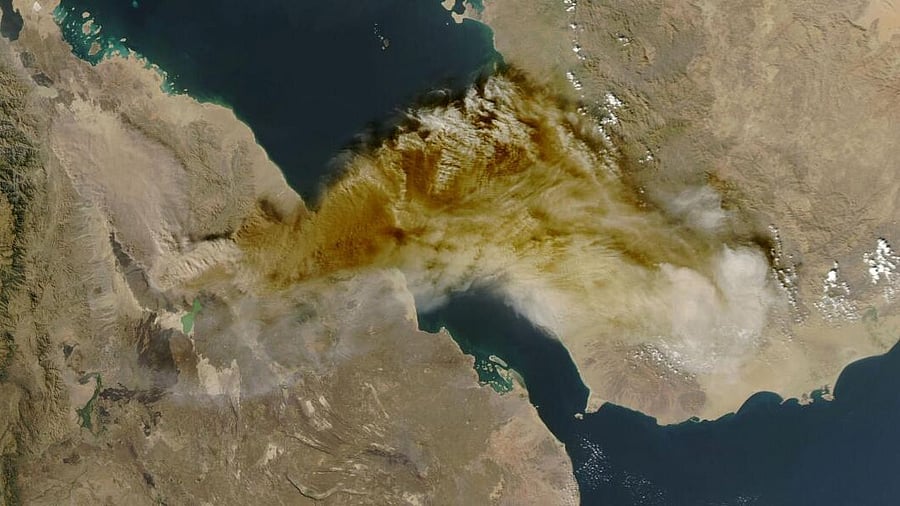
A satellite image shows ash rising from the eruption of the Hayli Gubbi volcano in Ethiopia as it drifts over the Red Sea, November 23, 2025.
Credit: Reuters/NASA
Ethiopia's Hayli Gubbi volcano has erupted for the first time in 12,000 years and the volcanic ash is likely to enter western and northern parts of India on Tuesday.
The volcano, which rises about 500 meters in altitude within the Rift Valley, started to erupt on Sunday. It is situated at an intense geological activity zone where two tectonic plates meet.
The Hayli Gubbi volcano resulted in the thick plumes of smoke of up to 14 kilometres into the sky after it erupted and is moving at a speed of 100-120 km/h towards north India.
According to according to the Toulouse Volcanic Ash Advisory Centre (VAAC), the eruption has now stopped but an ash cloud make its way towards India and Pakistan. In India it is projected to enter Gujarat and move towards Rajasthan, northwest Maharashtra, Delhi, Haryana, and Punjab by 10 pm on Tuesday. Later, it is also likely to impact the Himalayas and other regions.
The ash cloud is moving at altitudes ranging from 15,000–25,000 feet and up to 45,000 feet. It contains volcanic ash, sulphur dioxide, and fine particles of glass and rock.
Flights disrupted
The eruption of the volcano has already flights in India with airlines including IndiGo and Akasa Air suspending operations on affected corridors.
In a statement, Akasa Air said that it had cancelled flights to and from Jeddah, Kuwait, and Abu Dhabi.
“Our teams are closely monitoring the situation in line with international aviation advisories and safety protocols, and will take all necessary measures as required. At Akasa Air, the safety and well-being of our passengers remains our highest priority.”
Meanwhile, IndiGo said, “Our teams are closely tracking the situation in coordination with international aviation bodies. We are fully prepared with all necessary precautions to ensure safe and reliable operations. Our 6E teams are available across all touchpoints to support you with any assistance you may need. We will continue to monitor the developments round the clock and keep you informed of any updates to help minimise inconvenience (if any).”
However, Air India said that their flights have not been disrupted yet. "Following the volcanic eruption in Ethiopia, ash clouds have been observed over certain geographical regions. We are closely monitoring the situation and remain in constant touch with our operating crew. There is no major impact on Air India flights at this time. We will take all necessary steps under our precautionary plans to ensure the safety of our passengers, crew and aircraft, which remains our top priority. Our ground teams across the network will continue to support passengers and keep them updated on their flights."
The Directorate General of Civil Aviation (DGCA) has also instructed all Indian operators to revise their flight plans, adjust fuel loads, and avoid any airspace or altitudes affected by the volcanic ash cloud.
In its advisory, the regulator directed airlines to ensure that flight crews and aircraft engineers follow all established safety protocols when operating in or near volcanic ash.
